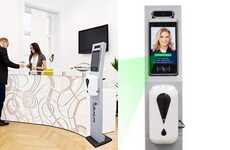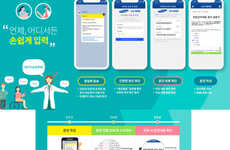
This Device Helps Reduce Hospital Wait Times
Katherine Pendrill — January 22, 2016 — Tech
'CrossChx Queue' is a new product that is designed to reduce hospital wait times. For many people, checking into a clinic can be a frustrating and time-consuming affair. Now there is a way to make the process more seamless by using biometric data.
CrossChx Queue is a premium product that allows patients to check-in at any hospital or clinic with a finger scan. The device relies on the company's universal database of patient information called 'SafeChx.' This system links all of the patient's medical record so that they are easily available when the individual checks-in at a clinic. The system not only speeds up the check-in process, but it also makes it easier for physicians to carry out a diagnosis because the patient's history is readily available.
The platform ultimately helps to reduce hospital wait times by streamlining the check-in process.
CrossChx Queue is a premium product that allows patients to check-in at any hospital or clinic with a finger scan. The device relies on the company's universal database of patient information called 'SafeChx.' This system links all of the patient's medical record so that they are easily available when the individual checks-in at a clinic. The system not only speeds up the check-in process, but it also makes it easier for physicians to carry out a diagnosis because the patient's history is readily available.
The platform ultimately helps to reduce hospital wait times by streamlining the check-in process.
Trend Themes
1. Biometric Hospital Registration - Leveraging biometric data for hospital check-in can revolutionize the registration process by making it more seamless and efficient.
2. Universal Patient Databases - Creating universal databases of patient information can streamline healthcare processes and make medical records easily accessible to healthcare providers.
3. Streamlined Diagnosis - Having readily available patient history can enhance the diagnostic process for physicians, leading to more efficient and accurate treatments.
Industry Implications
1. Healthcare - Implementing biometric registration and universal patient databases can improve efficiency and patient experience in the healthcare industry.
2. Technology - Developing innovative biometric devices and database systems presents opportunities for technological advancements in the healthcare sector.
3. Data Management - Efficiently managing and organizing patient data through universal databases can disrupt traditional data management practices in healthcare.
0.4
Score
Popularity
Activity
Freshness























